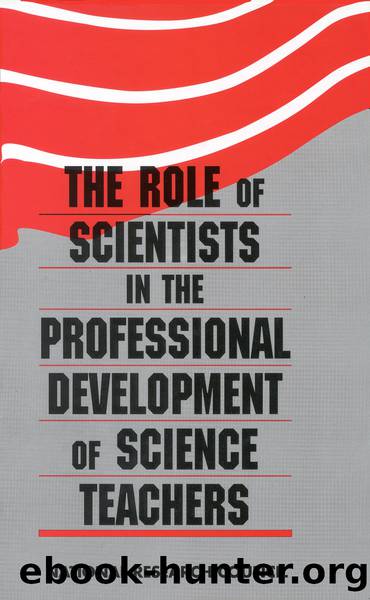The Role of Scientists in the Professional Development of Science Teachers by Committee on Biology Teacher Inservice Programs

Author:Committee on Biology Teacher Inservice Programs
Language: eng
Format: epub
Tags: Education: Math and Science Education
Publisher: NATIONAL ACADEMY PRESS
Published: 1996-04-29T00:00:00+00:00
COLORADO
20. Adventures in Science
Adams District Twelve-Five Star Schools
Contact: Nancy Kellogg, Northglenn, (303) 894-2144, FAX: n/a,
Internet: n/a
Adventures in Science was an inservice program that offered a menu of professional-development opportunities for teachers from September to May. Through presentations by exemplary scientists and teachers, workshops on content and pedagogy, and networking, teachers learned about cutting-edge scientific research and broadened their repertoire of hands-on activities for the classroom. The program, which reached hundreds of K-12 teachers in a 4-year period, was funded by Eisenhower Mathematics and Science Education State Grant funds and a small registration fee paid by the teachers. The program is no longer active.
**21. Colorado College-Integrated Sciences Teacher Enhancement Program
Colorado College
Contact: Paul Kuerbis, Colorado Springs, (719) 389-6726, FAX: (719) 634-4180,
Internet: [email protected]
The purpose of the Colorado College-Integrated Sciences Teacher Enhancement Program (CC-ISTEP) is to initiate and establish long-term collaboration among Colorado College scientists, mathematicians, science and mathematics educators and local and regional science and mathematics educators. CC-ISTEP will result in theme- or issue-based summer institutes through which teacher-participants (middle level) will improve their science-content understanding and instructional skills and will result in long-term changes in participantsâ teaching behavior through sound implementation efforts. CC-ISTEP builds on, refines, expands, and institutionalizes CO-STEP, the Colorado Science Teacher Enhancement Program, by putting into practice a graduate-degree program, the Master of Arts in Teaching Integrated Natural Sciences (MAT-INS).
22. Keystone Science School Teacher Institutes
Keystone Science School
Contact: Chris Minor, Keystone, (970) 468-5824, FAX: (970) 468-7769,
Internet: [email protected]
The Keystone Science School (KSS) provides residential field science programs for teachers and their students throughout the school year, using the Central Rocky Mountain ecosystems as an outdoor classroom. Specializing in field programs that augment and enhance the National and Colorado State Science
Standards, these programs are a one-of-a-kind hands-on experience for students and teachers. Additionally, KSS offers nationally renowned summer teacher-training programs for middle- and high-school teachers. Key Issues, a 1-week program, provides a framework for investigating an environmental issue with students at the middle-school level. Keys to Science is a 2-week program for high-school biology teachers in cellular and molecular biology. Both teacher programs provide resource liaisons and on-line followup, connecting teachersâlocally, regionally, and nationallyâto one another, other educators, and the world.
23. Project Learn
National Center for Atmospheric Research
Contact: Carol McLaren, Boulder, (303) 497-1172, FAX: (303) 497-8610,
Internet: [email protected]
Project Learn provides 55 middle- and junior-high-school science teachers with experiential training at the National Center for Atmospheric Research (NCAR) in Boulder, Colorado. Through three consecutive summers, workshops at NCAR are on atmospheric dynamics, ozone, and cycles of the earth and atmosphere and their impact on climate change. The program aims to improve the participantsâ understanding of atmospheric sciences, related mathematics- and science-teaching methods, and laboratory work. With funding from the National Science Foundation, the workshops bring in teachers from eight school districts in California, Colorado, North Carolina, and Texas. The project targets teachers of students from ethnic and minority groups who have been traditionally underrepresented in the sciences.
24. Hughes/NIH Research for Teachers
College of Natural Sciences, Colorado State University
Contact: C.W. Miller, Fort Collins, (970) 491-7842, FAX: (970) 491-7569,
Internet: cmiller@vines.
Download
This site does not store any files on its server. We only index and link to content provided by other sites. Please contact the content providers to delete copyright contents if any and email us, we'll remove relevant links or contents immediately.
The Art of Coaching Workbook by Elena Aguilar(51165)
Trainspotting by Irvine Welsh(21643)
Twilight of the Idols With the Antichrist and Ecce Homo by Friedrich Nietzsche(18624)
Fangirl by Rainbow Rowell(9229)
Periodization Training for Sports by Tudor Bompa(8254)
Change Your Questions, Change Your Life by Marilee Adams(7760)
This Is How You Lose Her by Junot Diaz(6877)
Asking the Right Questions: A Guide to Critical Thinking by M. Neil Browne & Stuart M. Keeley(5759)
Grit by Angela Duckworth(5605)
Red Sparrow by Jason Matthews(5467)
Paper Towns by Green John(5179)
Room 212 by Kate Stewart(5105)
Ken Follett - World without end by Ken Follett(4723)
Housekeeping by Marilynne Robinson(4436)
The Sports Rules Book by Human Kinetics(4379)
Papillon (English) by Henri Charrière(4263)
Double Down (Diary of a Wimpy Kid Book 11) by Jeff Kinney(4261)
The Motorcycle Diaries by Ernesto Che Guevara(4089)
Exercise Technique Manual for Resistance Training by National Strength & Conditioning Association(4063)
